They operate a small shop in Yunnan
Small shops resemble resilient and dynamic capillary vessels weaving through cities. Despite their modest size, they are intricately linked with our nation and numerous households. In their smallness, they embody business opportunities and create stories daily. This year, we journeyed along the Belt and Road, visiting various countries and cities. We stepped into small shops to catch a glimpse of economic development and the lives of the people.
In Yunnan, small shops serve as more than just commercial spaces; they also encapsulate regional culture and lifestyle. These shops provide essential items like firewood, rice, oil, and salt, alongside flowers, delicacies, and fashionable clothing. Let’s visit several small shops in Yunnan to experience their ingenuity and vitality.
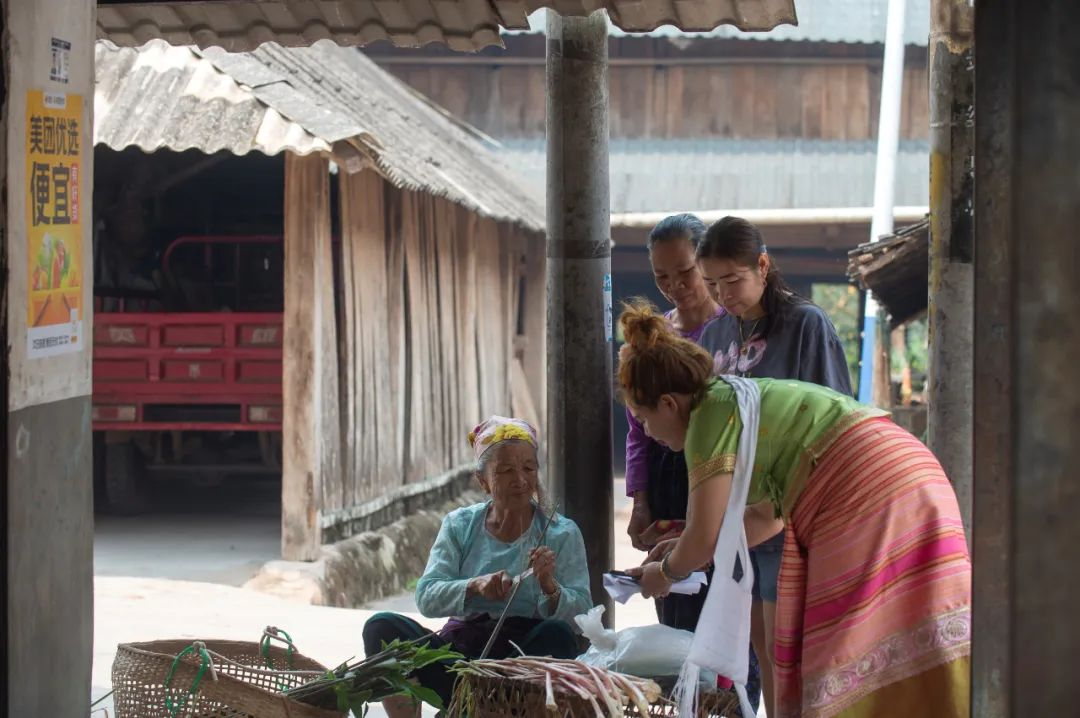
“Luxury items” become everyday dishes
Yijiaolong, a young woman of the Dai ethnic group, established the Zhuangbing Specialties Shop in Shangyong Community, Mohan Town, Mengla County, Xishuangbanna Dai Autonomous Prefecture, Yunnan Province, in 2018. By 2024, leveraging the power of e-commerce akin to an express train, the Zhuangbing Specialties Shop has successfully turned many exotic items, once considered rare by the locals, into common delicacies served on their dining tables.
“In August 2022, Meituan Youxuan’s staff members visited Mohan for on-site research. Upon discovering their plan to establish an e-commerce self-pickup spot in our community, I took the opportunity to open Mohan’s first e-commerce self-pickup location with a ‘let's give it a shot’ mindset,” Yijiaolong recalled.
Previously, essential items like rice, flour, and cooking oil could only be purchased during village fairs. For products not found at these fairs, villagers had to travel to Mengla county town or even more distant places to make their purchases.
“Within just a few years, the border town where I live has evolved to rival cities in terms of convenience. We now offer group purchases and upscale homestays in our community,” said Yijiaolong, who proudly serves as the manager of one of the initial Mingrida Supermarkets in Mohan.
Nowadays, every villager who knows how to use a smartphone can easily make online orders, with the goods arriving at Zhuangbing Specialties Shop the following day. Apart from the usual vegetables, beverages, and household items, former “luxury” items like turtles and hairy crabs are now regular delicacies on the villagers’ dining tables.
A resident of Shangyong Community surnamed Yan said, “I enjoy purchasing eggs here. Order today for delivery tomorrow. The eggs are big and fresh, and Yijiaolong provides friendly service.”
“The roads are continuously improving, making transportation more convenient. As a result, more people are visiting, leading to increased sales,” Yijiaolong said with confidence. “I believe that life will continue to improve, and I aspire for my shop to cater to even more local customers.”
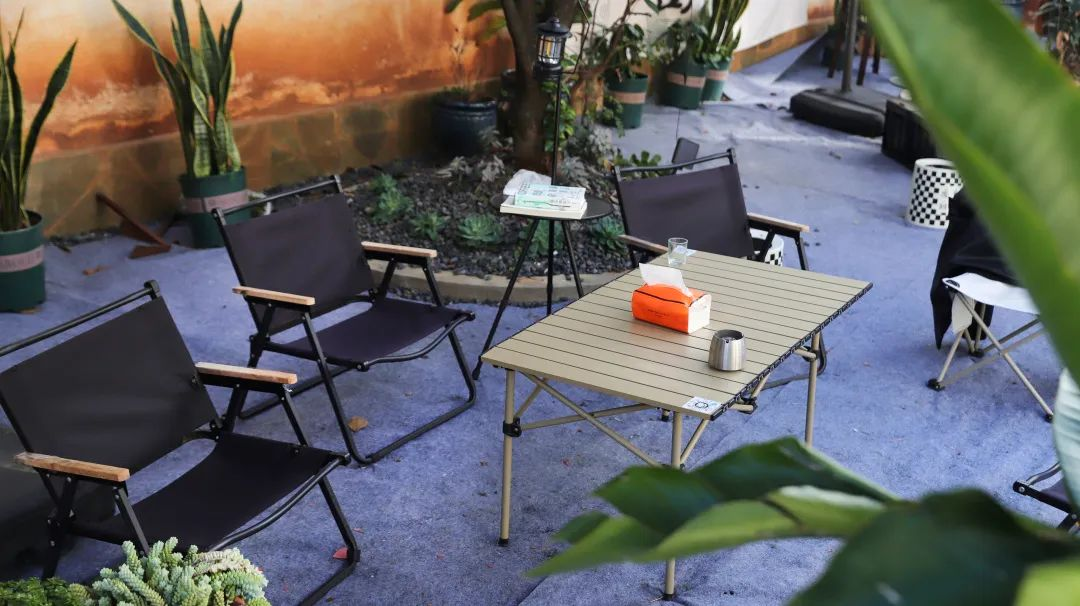
An immersive exploration of coffee culture
Located on Renmin Road in Longyang District, Baoshan City, there is a charming hidden gem of a café called Junye Coffee, renowned for its specialty hand-brewed coffee. As you enter the courtyard exuding a delightful camping ambiance, you will find the shop owner of Junye Coffee brewing coffee and sharing fascinating tales about the origins of the coffee beans he uses.
Junye Coffee offers personalized one-on-one service to enhance the coffee experience for customers. The shop owner personally imparts knowledge and anecdotes about coffee, demonstrating practical hand-brewing techniques while preparing coffee. Through this immersive experience, customers can truly appreciate the allure of coffee culture as they enjoy their cup of coffee.
“The shop owner excels as both a skilled barista and a wonderful storyteller. The individualized service ensures that every customer receives dedicated and thoughtful care. While savoring the coffee, I feel a sense of comfort and warmth akin to being at home,” shared Liu Yusi, an ardent supporter of Junye Coffee.
Junye Coffee satisfies customers’ cravings for exquisite coffee while offering a space for them to dive deep into the realm of coffee culture. Recently, the shop owner unveiled the “coffee travel” project. Each month, the shop showcases coffee beans sourced from renowned estates worldwide, allowing coffee enthusiasts to sample brews from various global regions. From the crisp Blue Mountain coffee of Jamaica, to the tangy Yirgacheffe coffee from Ethiopia, to the aromatic Huila coffee from Colombia, customers can embark on a flavorful journey around the world through their coffee cups.
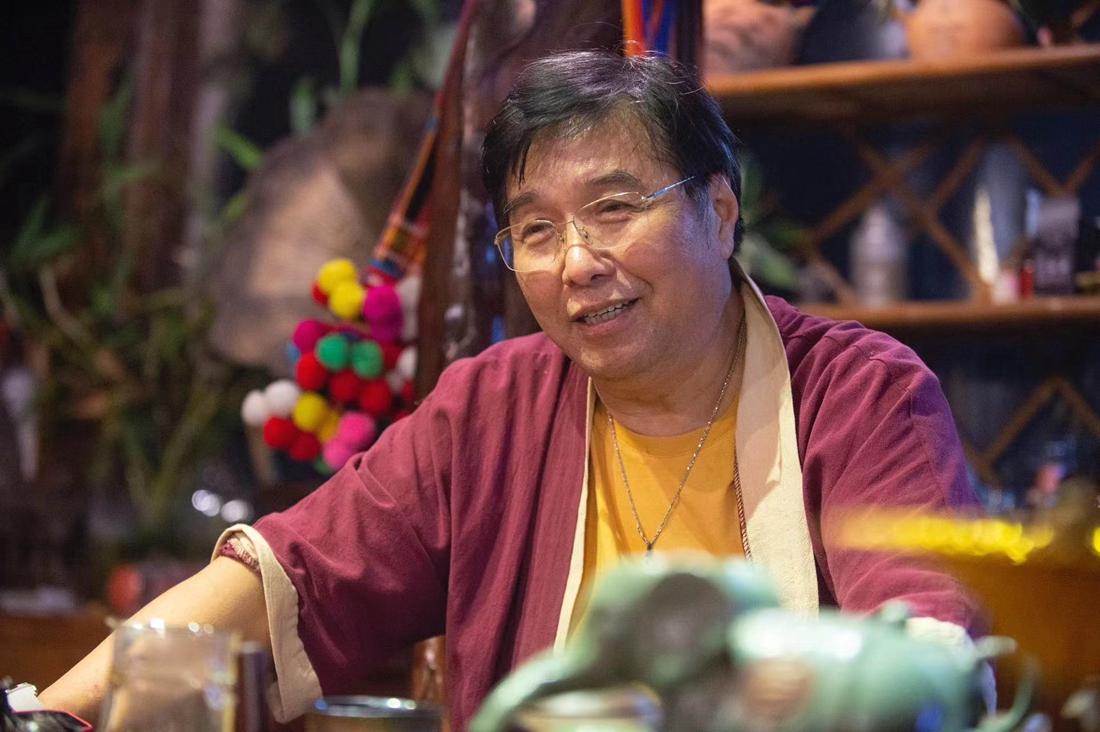
A “rest stop” for travel between China and Laos
Nestled in the mountains of Mohan Township, Daiyuan Homestay entices visitors from around the globe with its picturesque scenery and distinctive Dai ethnic charm.
“Daiyuan Homestay features the unique charm of the Dai ethnic culture, and we indulged in delectable authentic Dai cuisine during our stay. I will definitely revisit this place when I return to Mohan,” remarked Zhang, a female traveler from Guangzhou, who enjoyed a delightful three-day sojourn at the homestay.
Zhu Jiaping, the homestay manager and a Shanghai native, previously managed a company in Shanghai. Fortuitously, in 2014, he established this homestay in a Dai village near Mohan.
Zhu said that after the China-Laos Railway went into operation, numerous domestic visitors depart from Mohan daily. “The majority of my guests reserve accommodations via platforms like Meituan. Occasionally, we welcome European and American travelers. And many individuals en route to Laos make a short pit stop here,” Zhu added. He originally set up this homestay as a retirement retreat for himself, friends, and family. Subsequently, the influx of tourists steadily increased, often resulting in full occupancy of his 30-plus rooms.
“We had intended to journey to Laos via the China-Laos Railway and made a reservation at Daiyuan Homestay as we transited through Mohan. The homestay offers a delightful ambiance, showcasing the authentic style of a Dai village, allowing us to immerse ourselves in the rich Dai culture,” recounted Wang Xinyue, a traveler from Zhejiang.
Zhu envisions his homestay becoming a pivotal “rest stop” for tourists traveling between China and Laos.
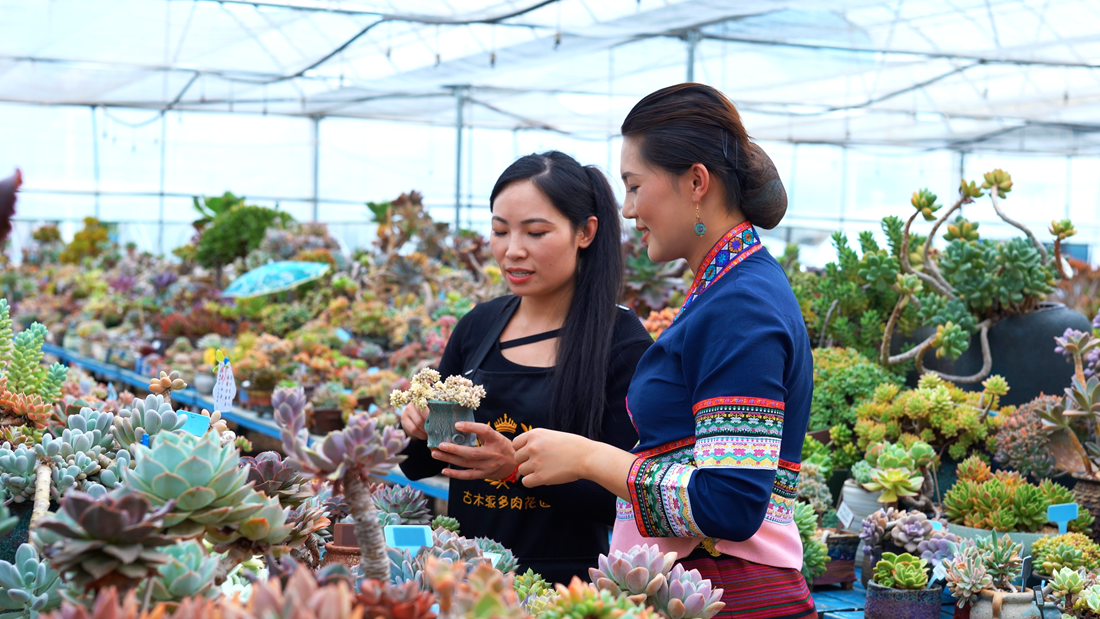
A succulent garden irresistibly alluring
In Kunming, Yunnan, plants and flowers are emblematic of the city’s vibrancy and form the foundation of numerous small shops. Among these, the enchanting succulent garden named Gumupai stands out. Through their inventive fostering services for succulent plants, the shop owners—a joyfully married couple—have attracted a multitude of succulent enthusiasts from across the country.
In 2018, Xie Xin moved from Anhui to Kunming with his family and established a succulent plantation. In 2020, to meet the growing demand from customers, they introduced an online "cloud fostering" service for succulent care. Each pot of succulents is assigned a number and labeled with the customer’s name. The fostering area is partitioned into different zones inspired by locations in Jin Yong’s martial arts novels, including Peach Blossom Island, Heartless Valley, Bright Peak, and Misty Peak. Customers can select their preferred zones for their succulents to be looked after.
With the popularity of live streaming, Xie Xin goes live once every two weeks. During each live broadcast, he not only highlights the fostering area but also shares insights on caring for succulent plants. The succulent garden Gumupai has significantly boosted the appeal of Yunnan's succulent plants.
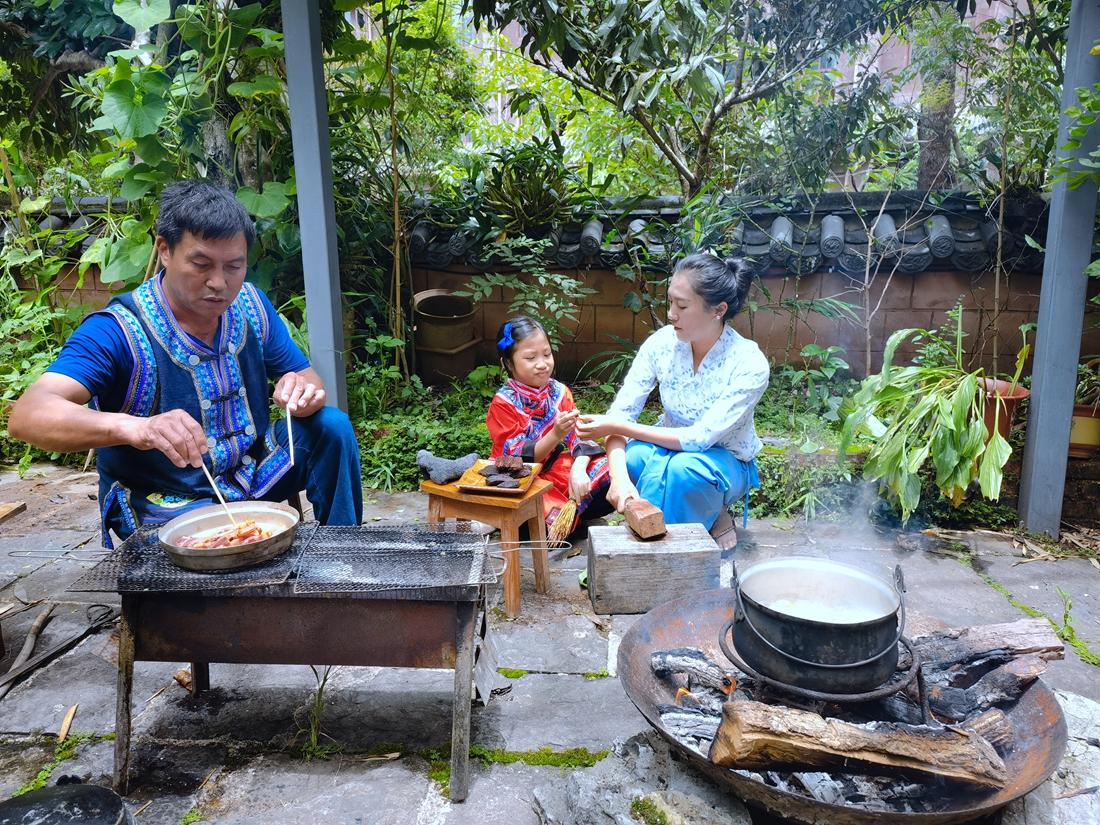
Diners flock to the horse caravan cuisine restaurant
Every day at noon, the renowned horse caravan cuisine restaurant in Nakeli Town, Pu’er City, Yunnan Province, bustles with customers. Zhao Yi, the fifth-generation inheritor of horse caravan cuisine, an intangible cultural heritage in Pu’er, is hard at work preparing an array of creatively named dishes by the fireplace. Among them, the “Three Brothers of the Horse Caravan” feature fire-roasted beef, bacon, and sausage, while the “Three Sisters of the Horse Caravan” include soya bean sprouts, tofu pudding, and tofu dregs.
The restaurant is situated in the county town of Ning’er Hani and Yi Autonomous County, a vital destination along the Chinese segment of the China-Laos Railway. Following the inauguration of the China-Laos Railway, this historically significant town on the ancient Tea Horse Road has transformed into a key access point for Yunnan’s engagement with the global community. Over time, horse caravan cuisine has experienced a rejuvenation, brimming with newfound energy and vitality.
As per Zhao Yi, numerous tourists visit this esteemed restaurant specifically to savor the horse caravan cuisine and delve into the rich history of the ancient Tea Horse Road. Following a day of exploration in Nakeli town, tourists often opt to spend the night at charming inns brimming with ethnic charm.
“Previously, the majority of tourists opted to endure the long and arduous journey to our remote town by driving their own cars. The China-Laos Railway has ushered in a more convenient mode of travel for visitors, attracting a more significant influx of customers, with many tourists coming from Laos and Thailand. This new dynamic is what they refer to as fast-paced travel coupled with leisurely sightseeing,” Zhao said joyfully.
Text by Yunnan Daily; Translated by YNTA